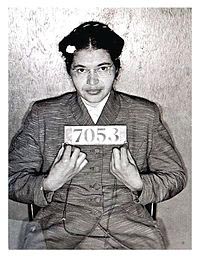ROSA PARKS

December 1, 1955
Rosa ParksFebruary 4, 1913 � October 24, 2005
The woman who sat down so that a nation could stand up.The date was December 1, 1955, Rosa Parks, a 42-year-old African American woman who worked as a seamstress, boarded a Montgomery Alabama City bus to go home from work. On this bus and on that day, Rosa Parks initiated a new era in the American quest for civil rights of Black Americans. Rosa was also a prominent civil rights advocate who served as the secretary for the Montgomery chapter of the NAACP. She sat behind the seats that were reserved for Whites. Jim Crow law stated that when the White seats filled Blacks were required to move back to the next row leaving an empty row of seats between the races. As the bus moved on its journey the White seats soon filled. Then a White man entered the bus. The driver, as required by law, insisted that all four Blacks sitting just to the rear of the White section give up their seats and move back so that the White man could sit there. Mrs. Parks quietly refused to give up her seat. Hers was a spontaneous and non pre-meditated act, however, previous acts of civil disobedience obviously influenced her action. She later said : �When I made that decision I knew that I had the strength of my ancestors with me.� This act resulted in her arrest and conviction of violating the Jim Crow laws� of segregation. Not having the means to fight her conviction a mutual friend of she and her NAACP boss, Edger Nixon, called Nixon and asked for his help. Nixon immediately came to her aid. He asked two of his wealthy and prominent supporters Attorney Clifford and Virginia Durr to help. They agreed to post the bail and offered to represent her. Nixon believed that Parks was an ideal candidate to challenge the discriminatory segregated seating policy. After conferring with her family Rosa agreed. This would lead to the �Montgomery Bus Boycott.� On two other occasions two Black women had been arrested for the same violation that Rosa had committed. However both were rejected as good candidates for challenging the law because Black leaders felt that they would not gain the necessary support from the liberal White community. One of these ladies was also an NAACP member and a person of good standing in the community but she was a pregnant un-married woman and therefore deemed not to be a good candidate. When one Montgomery African American woman heard about the arrest of the well-respected Rosa Parks she said: �They�ve messed with the wrong one now.� And indeed they had. |